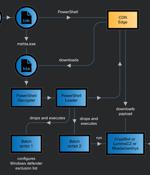Security News

A novel Linux Kernel cross-cache attack named SLUBStick has a 99% success in converting a limited heap vulnerability into an arbitrary memory read-and-write capability, letting the researchers...

Microsoft has fixed a known Windows 10 update issue that broke Microsoft Connected Cache node discovery on enterprise networks. The fix is included with the KB5040525 July 2024 preview update for Windows 10 22H2 released yesterday, which also comes with fixes for WDAC issues causing memory leaks and app failures,.

A high-severity flaw impacting the LiteSpeed Cache plugin for WordPress is being actively exploited by threat actors to create rogue admin accounts on susceptible websites. The findings come from...

Hackers have been targeting WordPress sites with an outdated version of the LiteSpeed Cache plugin to create administrator users and gain control of the websites. LiteSpeed Cache is advertised as a caching plugin used in over five million WordPress sites that helps speed up page loads, improve visitor experience, and boost Google Search ranking.

A new ongoing malware campaign has been observed distributing three different stealers, such as CryptBot, LummaC2, and Rhadamanthys hosted on Content Delivery Network (CDN) cache domains since at...

A threat actor has been using a content delivery network cache to store information-stealing malware in an ongoing campaign targeting systems U.S., the U.K., Germany, and Japan. Cisco Talos assesses with moderate confidence that the campaign is a CoralRaider operation, based on similarities in tactics, techniques, and procedures with past attacks attributed to the threat actor.

Microsoft says Windows 10 updates released since the start of the year are breaking Microsoft Connected Cache node discovery on enterprise networks. "After installing the January 2024 non-security update, released January 23, 2024, or later updates, some Windows devices which use the DHCP Option 235 for discovery of Microsoft Connected Cache nodes in their network might be unable to use the MCC nodes," Microsoft explains.

Google is introducing a significant change to Chrome's Back/Forward Cache behavior, allowing web pages to be stored in the cache, even if a webmaster specifies not to store a page in the browser's cache. "Bfcache is an in-memory cache that stores a complete snapshot of a page as the user is navigating away," explains Google's web.

The WordPress plugin WP Fastest Cache is vulnerable to an SQL injection vulnerability that could allow unauthenticated attackers to read the contents of the site's database. WP Fastest Cache is a caching plugin used to speed up page loads, improve visitor experience, and boost the site's ranking on Google search.

Boffins based in Germany and Austria have found a flaw in AMD's SEV trusted execution environment that makes it less than trustworthy. A successful attack - which assumes an attacker is running a malicious hypervisor protected by AMD SEV - could allow arbitrary code execution within a guest VM, the exposure of sensitive data, or privilege escalation.